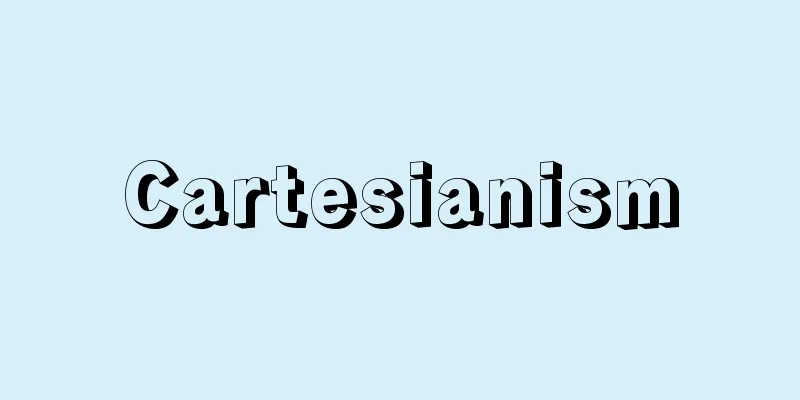Cartesianism

|
A philosophical position that adopts the basic principles of Descartes's way of thinking or philosophy, and such thinkers are called Cartesians. Therefore, there are various Cartesianisms depending on which aspect of Descartes' philosophy one focuses on. Apart from Cartesianism in the sense of rationalism and a strictly critical attitude as a method, his so-called dualism, especially his mechanistic natural science and mind-body theory, were the core of the formation of Cartesianism. In terms of the 17th century Cartesians, those who inherited natural science include H. Regius of the Netherlands, J. Rohault and P. Regis of France. However, Descartes' natural science is inseparable from his metaphysics, and if separated from the latter, it had a tendency to transform into materialism. Therefore, Cartesian philosophy, which was considered a dangerous idea but permeated people's way of thinking, became the basis of materialism during the Enlightenment. The mind-body problem was the biggest problem in Descartes' system, but it gave rise to three directions. One is the theory of chance, represented by J. Clauberg in Germany, A. Geerinckx in the Netherlands, and L. La Forge, G. Cordemore, and N. Malebranche in France. The second is the theory of pre-established harmony by G. Leibniz, and the last is the pantheistic monism of B. Spinoza. Of these, it is possible to point out the Cartesianist elements in Leibniz, who always advocated the anti-Cartesianism, as well as in Spinoza, who was influenced by Descartes in his natural sciences and geometrical proof methods, and in Malebranche, who declared his loyalty to Descartes, but it is not possible to call their individual philosophies Cartesian in their entirety. Another notable Cartesian is A. Arnauld, whose second edition of "Logic of Port Royal" (1664), co-authored with P. Nicole, included an excerpt from Descartes' posthumous work "Rules for the Direction of the Mind." Source: Encyclopaedia Britannica Concise Encyclopedia About Encyclopaedia Britannica Concise Encyclopedia Information |
|
デカルトの思考法もしくはその哲学の基本的原理をとる哲学的立場をいい,そうした思想家をカルテジアンという。したがって,デカルト哲学のどの面に注目するかによって,さまざまなカルテジアニスムがある。理性主義や方法としての厳密な批判的態度の意味でいわれるカルテジアニスムを除けば,いわゆる彼の二元論,なかんずく機械論的自然学と心身関係論がカルテジアニスム形成の核となった。 17世紀のカルテジアンに即していえば,自然学を継承した人としてオランダの H.レギウス,フランスの J.ロオー,P.レジスらがいる。しかしデカルトの自然学はその形而上学と表裏一体をなすものであり,後者から切り離されれば唯物論に転化する傾向を含んでいた。そこで危険思想視されながら人々の思考様式に浸透していったデカルト哲学は,啓蒙期の唯物論の基盤となった。心身問題はデカルトの体系における最大の問題点をなすものであったが,そこから3つの方向が生れた。一つは偶因論であり,ドイツの J.クラウベルク,オランダの A.ゲーリンクス,フランスの L.ラ・フォルジュ,G.コルドモア,N.マルブランシュらが代表者である。第2は G.ライプニッツによる予定調和説であり,最後は B.スピノザの汎神論的一元論である。このうち,常に反デカルトを標榜したライプニッツはもちろん,自然学や幾何学的証明法でデカルトの影響を受けたスピノザ,デカルトへの忠実を表明していたマルブランシュも,それぞれにおけるカルテジアニスムの部分を指摘することはできても,その個性的な哲学の全体をカルテジアニスムと呼ぶことはできない。ほかに著名なカルテジアンとしては A.アルノーがおり,P.ニコルとの共著『ポール・ロワイヤルの論理学』第2版 (1664) は,デカルトの遺稿『精神指導の規則』の抜粋を付した。
出典 ブリタニカ国際大百科事典 小項目事典ブリタニカ国際大百科事典 小項目事典について 情報 |
Recommend
Echizen Ancient Kiln Sites - Echizen Ancient Kiln Sites
...The village is located in a mountain basin in ...
Anser cygnoides (English spelling)
… [Yukio Taniguchi]. … *Some of the terminology t...
Principles of Economics
A. Marshall's major work, published in 1890. I...
Dimorphotheca aurantiaca (English spelling)
… [Eiichi Asayama]. … *Some of the terminology th...
Kutaisi (English spelling) Кутаиси/Kutaisi
A city in western Georgia. It is located on the a...
Iris (English spelling)
In Greek mythology, she was the daughter of Thauma...
Sefuri Mountains - Sefurisanchi
This granite mountain range is part of the Tsukus...
Bryce Canyon National Park - Bryce Canyon National Park
A national park in southern Utah, USA. It became a...
League
…Because it is the legal unit in the UK, it is ca...
Keizo Uenaka
1876-1960 A chemist from the Meiji to Showa era. ...
Okawa [town] - Okawa
A former town in Okawa County, eastern Kagawa Pref...
Cummingtonite (Cummingtonite)
Also called cummingtonite. A type of amphibole, it...
Rain
…Since the days of the naval port, the area aroun...
Cribellum
…In addition to these projections, some have smal...
Medical Social Worker
...The former refers to social welfare, social se...









